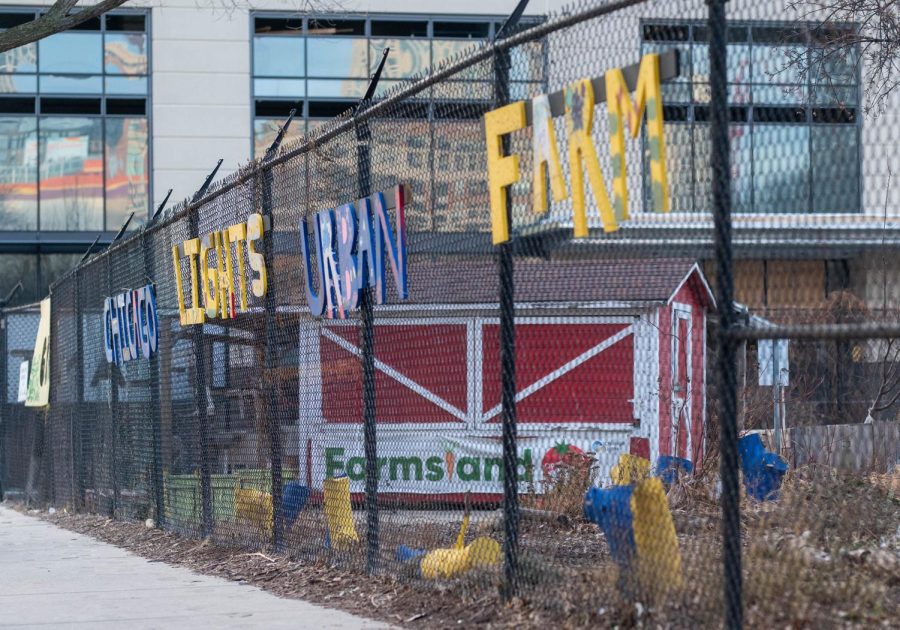Urban farming catalyzes sustainability
For some, urban agriculture is more than a simple passion: it’s a way of life
FUTURE OF FOOD. Across Chicago, empty lots and neighborhood spaces are being revitalized into urban farms. For those who believe in environmental conservation, urban agrictulture produces healthy and sustainable options.
March 3, 2023
As the days grow longer, the plots of soil in the once-empty lot in East Garfield Park will be prepared and planted. The rattling of the chain-link fence surrounding the lot will subside and be replaced with the voices and laughter of volunteers and regular farmers as the growing season begins.
Urban agriculture creates a cycle of sustainability, opportunity and education in neighborhoods without access to organic foods. Yet, for some, it is more than their occupation.
Malcolm Evans, director of farms at Urban Growers Collective, began farming at age 9 when he met the organization’s founder, Erika Allen. Urban Growers Collective is a nonprofit that addresses food inequality by growing organic food for food deserts: neighborhoods without access to convenient, affordable and healthy food.
“I grew up in Cabrini Green, and at that time they were just installing a garden in the neighborhood,” Mr. Evans said. “They did it on the old basketball court where I lived at that time and where me and my friends hang out, and we was just stumbling around the building and seeing that they was doing something over there that day and went over there to see what was going on.”
While in high school, Mr. Evans began the composting program at the now-closed Growing Power Chicago collecting compost from restaurants throughout the city after school and on weekends. In 2017, he became the Production Manager at UGC and later became director of farms.
“Folks in food desert neighborhoods who don’t have — or don’t have access to — healthy food and bringing healthy food and creating these nursery zones and these spots that folks can be vulnerable and like also know about food and have a space with folks that care about them,” he said.
Urban agriculture has been a passion for Mr. Evans and he has been able to pass that passion on to others in the community. One challenge for this has been willingness by those communities to embrace urban agriculture.
“When you start understanding food and get into food, this work really inspires you. It takes you to the next level,” he said. “But you gotta have patience and have passion for it. You can’t come into folks’ neighborhoods or come into people and try to teach them stuff that they’re not interested in. Folks gotta already understand it a little and just need a little bit more help.”
UGC allows one-time, drop-in volunteers for its South Chicago farm, where potential farmers can also sign up for a recurring volunteer shift.
Another aspect of UGC is its Fresh Moves Mobile Market, a bus converted into a mobile farmers market.
“I think my big highlight is always seeing these fields be loaded with delicious vegetables; also bringing back folks who’ve been doing it, folks who were in our youth club program, and also folks who volunteer to employ them,” Mr. Evans said.
Urban farming brings unique challenges, according to Steve Schultz, farm manager at another organization, Chicago FarmWorks.
“You’re dealing with pests and pathogens and diseases on the farm all the time,” Mr. Shultz said, “and every year it can be something new that you have to problem solve and push yourself through and find a solution to.”
Another difficulty for the farms has been food waste.
“It’s one of our concentrations of what we’re trying to reduce. As for food, anytime food breaks down in the roots, it creates methane, and a lot of the recent research shows it is one of the biggest impacts in climate change right now,” he said. “So us as a farm, it’s our, it’s our duty and our responsibility to try to figure out how we can reduce that.”
The goal of Chicago FarmWorks is not just to grow and distribute organic food to communities in need.
“We have a workforce development side to FarmWorks as well, which we are working with individuals that have barriers to employment. It could be previous incarceration, could be addiction, could be homelessness, could be many, many different things,” he said. “One of the reasons that the farm was created was to be a stepping stone for those individuals in the program.”
The workforce development program within Chicago Farmworks finds full-time, long-term employment for individuals on the farm to get reacquainted with the structure of holding a job.
“For a lot of those individuals as well, it’s kind of a gateway into the world of work again. As farming for the summer is very peaceful. It can be very healing depending on the trauma that those individuals had gone through up to that point,” Mr. Schultz said.
Mr. Schultz has been able to give back to the community while also building his passion for urban agriculture.
“It’s being amongst all that ecology and environment that makes me happy to go out there every day, even the days that are tough. So it’s no longer offices, it’s no longer computers and screens,” Mr. Shcultz said. “I’m just out there with the plants and being able to have this environmental impact with the work that I do, a social impact that I do, and I get to do it all outside. And for that I consider myself very, very lucky.”





























































